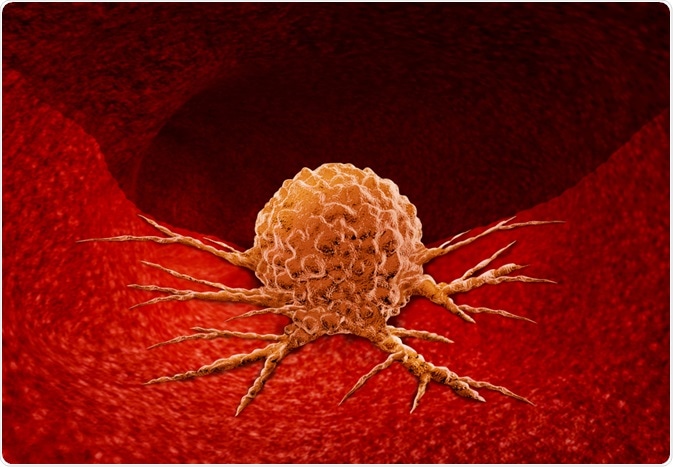New research is revealing the link between acidosis and tumor progression. Evidence has shown that acidic pH conditions can affect gene expression, leading to cells adapting for growth and survival in these environments.
 Image Credit: Lightspring / Shutterstock.com
Image Credit: Lightspring / Shutterstock.com
While cancer has long been considered to have a strong genetic basis, a growing body of research emphasizes the role of the metabolic reprogramming associated with acidosis in the progression of the disease. Gaining a deeper understanding of the relationship between acidosis and tumor progression would help establish new therapeutic strategies.
Targeting tumor acidosis as a therapeutic target
Recent studies have highlighted the complex metabolic reprogramming that occurs during cancer. This reprogramming has been shown to rely on metabolic cooperation between the cancerous cells and the basement membrane, extracellular matrix, immune cells, fibroblasts, and vasculature that makes up the surrounding tumor stroma.
Many clinical studies have supported the link between metabolic reprogramming and cancer progression, demonstrating that interrupting a tumor’s metabolic program can have a positive impact on patient outcomes.
The “Warburg Effect” is arguably the most thoroughly studied metabolic adaptation in cancer. It relates to the fermentation of glucose, converting it to lactic acid, even in the presence of oxygen. While much evidence has been collected on the “Warburg Effect” in cancer, its exact mechanisms still remain unclear.
However, the acidification of the tumor microenvironment is strongly considered to be an important consequence of the “Warburg Effect”, which, in turn, influences cancer progression and malignancy.
Cells adapt to acidosis, leading to the selection of malignant behaviors, including enhanced metastasis and invasion, chem-resistance, and inhibition of the immune response and immune surveillance. Fortunately, the metabolic reprogramming that is induced via adaptation to acidosis also creates therapeutic vulnerabilities, opening the door to potential new, effective therapeutic avenues.
The current research highlights four possible methods to targeting tumor acidosis as a therapeutic target: using buffers to neutralize acid, targeting metabolic vulnerabilities introduced by acidosis, developing acid-activatable drugs and nanomedicines, and inhibiting the metabolic processes that create the acidic environment.
Direct targeting with oral buffers
The application of oral buffers is the most direct approach to targeting tumor acidity. Studies have shown that the addition of such buffers to the drinking water of mice with tumors has the impact of increasing the tumor pH without affecting systemic pH levels.
The buffers work not to amend the pH of the body, but to adjust the pH of the tumor so that it matches that of the rest of the body. Numerous studies have shown the efficacy of oral buffers in preventing metastases, and in reducing tumor aggressiveness. However, these studies have used mouse models, and further clinical research is needed using human participants.
Targeting metabolic vulnerabilities
Metabolic pathways in acidic environments can be distinguished from those in neutral pHs. The way they differ can be exploited, allowing scientists to target and learn from the way pathways behave in acidic pHs. Scientists have been able to identify enzymes that are vital for helping cells to thrive in acidic environments, but not in neutral environments.
Studies have explored how these enzymes contribute to tumor growth. Their findings have opened up potent new therapeutic avenues, suggesting which enzymes should be targeted in order to inhibit tumor growth, rather than allow it to proliferate.
Acid-activated agents
Scientists are also interested in investigating agents that are active only under relatively acidic conditions. Such agents include those that deliver therapy selectively to acidic microenvironment, known as “acid-labile” and those that are known as “acid-activated” as it is the acidic environment that activates them.
Labile linkers on antibody-drug conjugates (ADC) and some nanoparticles are included in the family of acid-labile agents. One particularly interesting field of current research is focussing on exploring how acid-labile nanoparticles function to dissolve in the tumor’s acidic microenvironment.
Recently, scientists led by Engelman have established a group of peptides, known as ”pH low inserting peptides” (pHLIPs). pHLIPs are a group of acid-activated agents whose configuration is impacted by acidic environments, helping the peptide insert itself across the plasma membrane.
Targeting acidogenic metabolism
Tumors can be defined by the presence of a “reverse pH gradient” as their internal environment is more acidic than the outside which is more alkaline. This gradient is maintained by an enhanced expression of numerous acid efflux proteins and plasma membrane transporters who play a role in pH homeostasis.
Research has demonstrated that inhibiting these proteins and transporters effectively disrupts the pH homeostasis, highlighting the potential therapeutic effect of inhibiting certain transporters and exchangers.
Exposure to therapeutic vulnerabilities
Research has confirmed the association between tumor acidity and tumor progression. Now, research is focussing on how to exploit this to develop new therapeutic strategies. Recent preclinical and clinical studies have suggested that strategies that target acidity may improve responses to therapy.
It has only recently been widely understood that the acidic environment can not only promote cancer progression but also expose the tumor to therapeutic vulnerabilities. Exploration of how to target these vulnerabilities will likely be the focus of future research.
Sources
Pillai, S., Damaghi, M., Marunaka, Y., Spugnini, E., Fais, S. and Gillies, R., 2019. Causes, consequences, and therapy of tumors acidosis. Cancer and Metastasis Reviews, 38(1-2), pp.205-222. https://www.ncbi.nlm.nih.gov/pmc/articles/PMC6625890/
Riemann, A., Reime, S. and Thews, O., 2017. Tumor Acidosis and Hypoxia Differently Modulate the Inflammatory Program: Measurements In Vitro and In Vivo. Neoplasia, 19(12), pp.1033-1042. https://www.sciencedirect.com/science/article/pii/S1476558617302919
Wojtkowiak, J., Rothberg, J., Kumar, V., Schramm, K., Haller, E., Proemsey, J., Lloyd, M., Sloane, B. and Gillies, R., 2012. Chronic Autophagy Is a Cellular Adaptation to Tumor Acidic pH Microenvironments. Cancer Research, 72(16), pp.3938-3947. https://cancerres.aacrjournals.org/content/72/16/3938
Further Reading
Last Updated: Dec 22, 2020